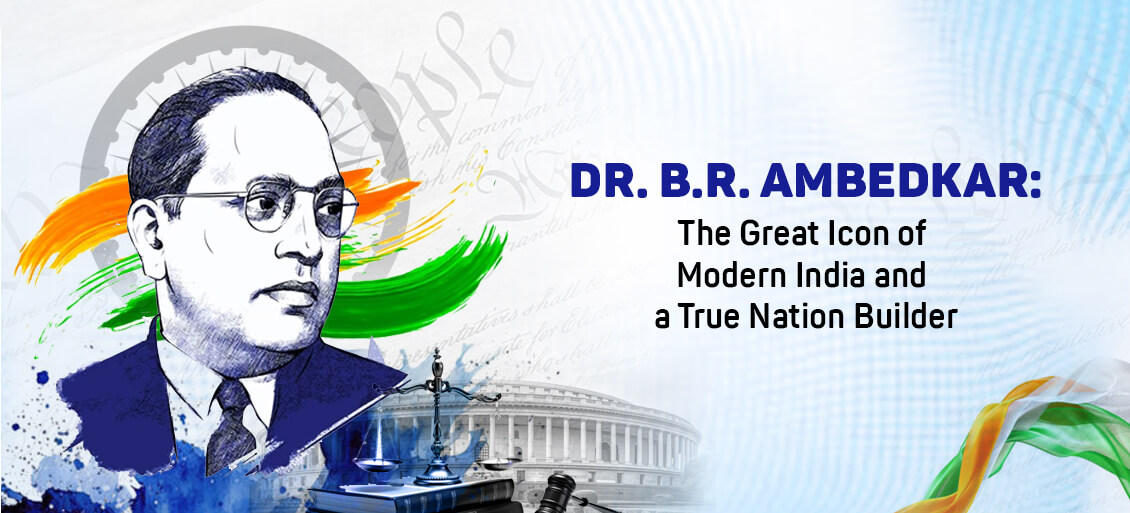
- Home
- About
- Knowledge Center
- Legislative Landscape
- Resources
- #TOGETHERFORBHARA
When we reflect on the pillars of modern India, few names shine as brightly and profoundly as that of Dr. Bhimrao Ramji Ambedkar. Revered as the principal architect of the Indian Constitution, Dr. Ambedkar’s contributions stretch far beyond the realm of law. He was a visionary who transformed India’s social, political, and intellectual fabric. In every sense of the word, he was a nation builder—someone who reshaped the identity of a deeply divided society and laid the groundwork for an egalitarian democracy.
A Life Rooted in Struggle and Purpose
Born on 14 April 1891 in Mhow (now in Madhya Pradesh) into a Dalit (formerly’untouchable’) family, Ambedkar faced discrimination from an early age. Denied basic human dignity, he had to overcome enormous social obstacles simply to attend school. Yet his thirst for knowledge remained unquenched. With rare determination, he went on to earn doctorates from prestigious institutions such as Columbia University and the London School of Economics—a feat unheard of for an Indian from a marginalized community at that time.
His experiences with social exclusion were not mere footnotes in his life; they became the very foundation of his mission. He realized that education, social reform, and political representation were the only means to uplift the oppressed.
Architect of the Indian Constitution
Perhaps Ambedkar’s most visible and enduring legacy is his role as the Chairman of the Drafting Committee of the Indian Constitution. In a newly independent India, rife with diversity and division, it was Ambedkar who drafted a document that would bind the nation together. The Indian Constitution is one of the most comprehensive in the world, ensuring fundamental rights, equality before the law, and protection against discrimination for all citizens.
His insistence on constitutional morality, social justice, and individual freedoms created a legal framework where liberty, equality, and fraternity became not just ideals, but actionable commitments. For him, the Constitution was not merely a legal document; it was a blueprint for social revolution.
A Champion of Social Justice
Dr. Ambedkar dedicated his life to eradicating the deeply rooted caste system in Indian society. His battle against untouchability and caste-based oppression was relentless. He founded several newspapers and journals like Mooknayak and Bahishkrit Bharat, through which he raised awareness and inspired a mass movement for Dalit rights.
In 1932, he negotiated the Poona Pact with Mahatma Gandhi, securing separate electorates for the Depressed Classes which were later replaced by reserved seats in the legislature. Though controversial at the time, this was a landmark moment in ensuring political representation for the marginalized.
He also led the Mahad Satyagraha to assert the right of Dalits to draw water from public tanks and the Kalaram Temple entry movement, challenging entrenched social practices.
Economic Visionary and Policy Thinker
While he is best remembered for his social and legal reforms, Ambedkar was also a brilliant economist. Long before India’s economic planning began, he had outlined ideas for water management, agriculture reform, industrialization, and labour rights.
He was instrumental in setting up the Finance Commission of India and proposed the Reserve Bank of India (RBI) in his doctoral thesis, which was later adopted in 1935. His vision was that of a self-reliant and equitable economy, one that would empower every Indian, irrespective of their caste or background.
Ambedkar’s Conversion to Buddhism: A Spiritual Revolution
In 1956, shortly before his death, Dr. Ambedkar publicly embraced Buddhism along with hundreds of thousands of his followers. For him, conversion was not just a personal act of faith but a symbolic rejection of caste-based Hindu orthodoxy. He chose Buddhism for its rationality, ethical foundations, and focus on human dignity.
This mass conversion was a powerful socio-political statement—a turning point that offered spiritual liberation to millions. It was perhaps the final act in a life dedicated to fighting inequality.
Legacy and Relevance Today
Dr. Ambedkar’s legacy has only grown stronger with time. Today, he is not just remembered as a Dalit icon or a constitutional expert—he is seen as the voice of modern India, someone who fought for justice not just for a community but for the soul of the nation. In a country still grappling with issues of inequality, social exclusion, and economic disparity, Ambedkar’s teachings serve as a guiding light. His call for “Educate, Agitate, Organize” remains as relevant as ever.
Dr. Ambedkar as a Nation Builder
To call Dr. Ambedkar a “nation builder” is not a ceremonial title; it is a factual recognition of his unparalleled impact. While political leaders fought for independence, Ambedkar fought for true freedom—freedom from social bondage, from ignorance, and from institutional discrimination.
He envisioned an India where caste would have no place, where opportunities would be equal, and where every citizen, regardless of birth, could dream big. His work laid the institutional foundations that keep India united today. He was a reformer, a revolutionary, a scholar, a lawmaker, and a leader. But above all, he was a humanitarian who believed that the worth of a nation is measured by how it treats its most vulnerable.
A Timeless Torchbearer
In remembering Dr. B.R. Ambedkar, we are not just honoring a historical figure—we are reaffirming our commitment to the values he stood for. His life is a testimony to the power of ideas, perseverance, and courage in the face of adversity. He remains the greatest icon of modern India not just because of what he achieved, but because of the possibilities he unlocked for generations to come. He dreamt of an India where no one would be oppressed, and everyone would be empowered.